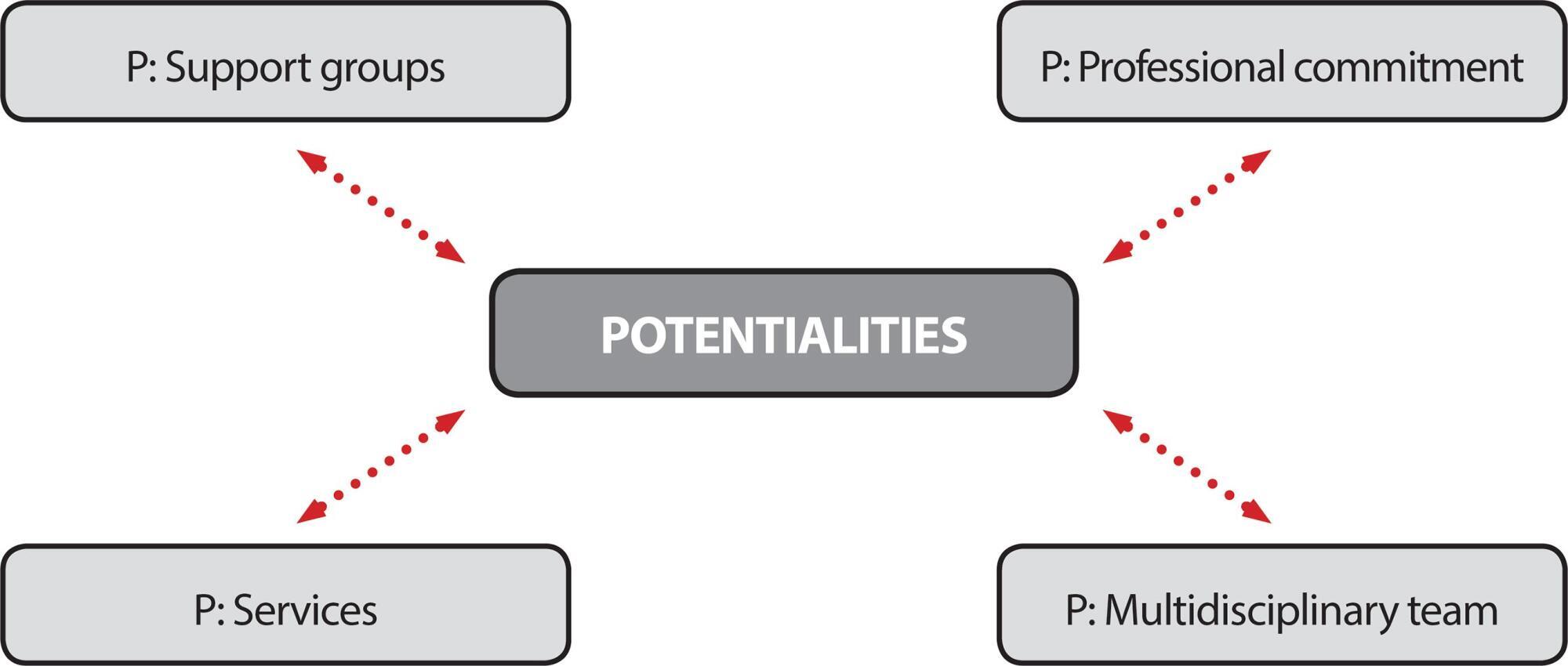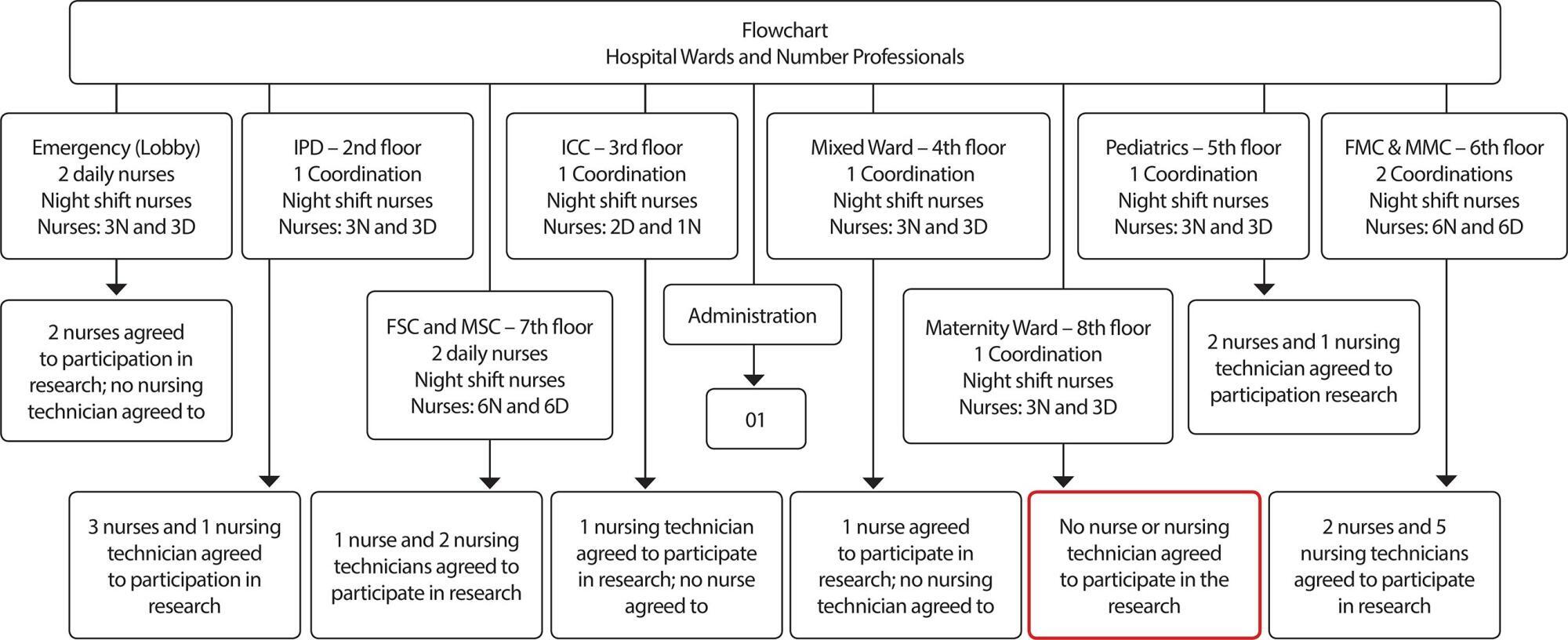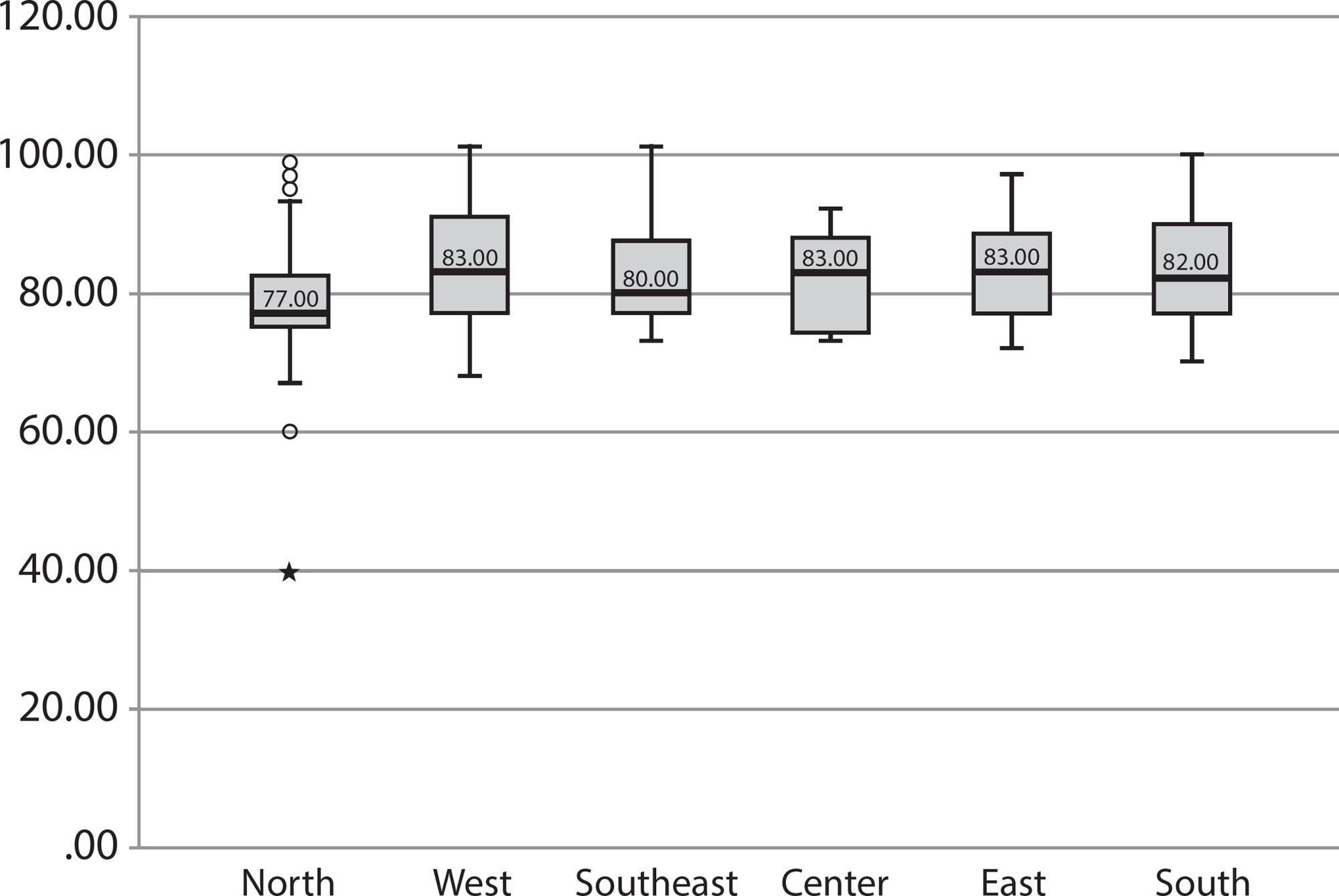-
ORIGINAL ARTICLE05-03-2024
Josicélia Dumêt Fernandes’ professional trajectory: contributions to psychiatric and mental health nursing
Revista Brasileira de Enfermagem. 2024;77(1):e20230174
Abstract
ORIGINAL ARTICLEJosicélia Dumêt Fernandes’ professional trajectory: contributions to psychiatric and mental health nursing
Revista Brasileira de Enfermagem. 2024;77(1):e20230174
DOI 10.1590/0034-7167-2023-0174
Views0See moreABSTRACT
Objectives:
to analyze nurse Josicélia Dumêt Fernandes’ life story, with emphasis on her work in the psychiatry and mental health fields.
Methods:
historical, qualitative research. Semi-structured interviews and documentary research were used as data collection techniques, collected from September to October 2021. For data analysis, we opted for the content analysis method and comparison with the Foucauldian philosophical framework.
Results:
four categories emerged: Transforming herself and mental health practices; (Re)framing professional practice; Nursing practice and power relations; and The paths and implications in the psychiatry and mental health fields.
Final Considerations:
the study of the biographer demonstrates a search for transformation of herself and mental health practices, with a rupture in paradigms and reframing of her practice in psychiatry and mental health.
-
ORIGINAL ARTICLE04-22-2024
Adherence to Covid-19 vaccination during the pandemic: the influence of fake news
Revista Brasileira de Enfermagem. 2024;77(1):e20230284
Abstract
ORIGINAL ARTICLEAdherence to Covid-19 vaccination during the pandemic: the influence of fake news
Revista Brasileira de Enfermagem. 2024;77(1):e20230284
DOI 10.1590/0034-7167-2023-0284
Views1See moreABSTRACT
Objectives:
to understand how fake news has influenced adherence to Covid-19 immunization, from the perspective of health professionals.
Methods:
a qualitative, descriptive-exploratory study was conducted in Campo Grande – MS. Twenty nursing professionals working in vaccine rooms or managing immunobiologicals participated through semi-structured interviews. The interviews were audio-recorded, fully transcribed, and subjected to thematic content analysis.
Results:
two categories emerged in which the professionals highlighted an increase in vaccine hesitancy among the population, influenced by fake news and denialist actions, which negatively interfered with the population’s trust in vaccines and in the professionals administering them.
Final Considerations:
concerns about vaccine safety and denialist actions by authorities and media outlets can contribute to the phenomenon of non-vaccination. The valorization of science, the promotion of educational actions, and raising public awareness about immunization were presented as strategies to increase vaccine coverage
-
ORIGINAL ARTICLE04-22-2024
Learning difficulties in school children: health and education professionals’ perceptions
Revista Brasileira de Enfermagem. 2024;77(1):e20230074
Abstract
ORIGINAL ARTICLELearning difficulties in school children: health and education professionals’ perceptions
Revista Brasileira de Enfermagem. 2024;77(1):e20230074
DOI 10.1590/0034-7167-2023-0074
Views0See moreABSTRACT
Objectives:
to understand health and education professionals’ perceptions regarding children’s learning difficulties in public schools.
Methods:
qualitative research, of the participatory action type, linked to Paulo Freire’s Research Itinerary. Forty-five professionals participated, through interviews and a Virtual Culture Circle. The analysis was developed through careful reading, reflection and interpretation of highlighted topics.
Results:
professionals discussed the (in)visibility of learning difficulties, strategies and resources in the educational sector and the search for solutions in the health sector. It was found that the production of complaints related to school learning is attributed predominantly as an individual problem of children or their family, exempting the educational institution from this process.
Final Considerations:
greater investment in professional training and development policies is urgently needed to facilitate coordination between sectors, with a view to overcoming outdated pedagogical and health models.
-
ORIGINAL ARTICLE04-22-2024
Mothers’ perception of the care of newborn in the home environment
Revista Brasileira de Enfermagem. 2024;77(1):e20230080
Abstract
ORIGINAL ARTICLEMothers’ perception of the care of newborn in the home environment
Revista Brasileira de Enfermagem. 2024;77(1):e20230080
DOI 10.1590/0034-7167-2023-0080
Views1See moreABSTRACT
Objectives:
to identify mothers’ perceptions about caring for newborns in the home environment, from the perspective of complexity thinking.
Methods:
qualitative, exploratory and descriptive research, carried out between November/2022 and February/2023. Data were collected through individual interviews with 21 mothers from southern Brazil who cared for newborns at home and analyzed using the thematic analysis technique.
Results:
the four thematic axes resulting from the data analysis: Living amidst order and disorder; embracing singularities; dealing with the certain and the uncertain; support network in the (re)organizing process demonstrate that the mother caring for a newborn in their home environment experiences a distinct and plural adaptive process, which must be welcomed and understood by health professionals who work within the family environment.
Final Considerations:
the care of newborns in a home environment, in the perception of mothers, requires differentiated attention and a formal or informal support network that considers the unique specificities of each woman/mother in the personal, family and social spheres. Therefore, in addition to the social support network, it is important to rethink home intervention approaches.
-
ORIGINAL ARTICLE04-22-2024
Nurses’ perception of the nursing process and its relationship with leadership
Revista Brasileira de Enfermagem. 2024;77(1):e20230371
Abstract
ORIGINAL ARTICLENurses’ perception of the nursing process and its relationship with leadership
Revista Brasileira de Enfermagem. 2024;77(1):e20230371
DOI 10.1590/0034-7167-2023-0371
Views0See moreABSTRACT
Objectives:
to describe Nurses’ perception of the Nursing Process and its relationship with leadership.
Methods:
action research conducted between September/2021 and April/2022 with nurses from a medium-sized hospital in southern Brazil. The data investigated, one of the stages of the method, was collected using the Focus Group technique and submitted to Strategic Focus Analysis.
Results:
three categories emerged from the organized and analyzed data, namely: Nursing Process: a tool that qualifies nursing care; Conditions that weaken the Nursing Process; and Strategies that enhance the Systematization of Nursing Care.
Final Considerations:
the perception of the Nursing Process and its relationship with leadership are not always understood as complementary themes. Although they recognize that the Nursing Process is sometimes imposed as normative, nurses do not perceive the importance of the role of the leader, who is considered a key player in conducting and boosting the Systematization of Nursing Care.

-
03-18-2024
Nursing rights in comics: educational technological innovation report
Revista Brasileira de Enfermagem. 2024;77:e20230438
Abstract
Nursing rights in comics: educational technological innovation report
Revista Brasileira de Enfermagem. 2024;77:e20230438
DOI 10.1590/0034-7167-2023-0438
Views0See moreABSTRACT
Objectives:
to report an educational technology construction on nursing professionals’ rights.
Methods:
an experience report on educational technology construction during the crediting of university extension hours in an undergraduate nursing course at a Brazilian public university, between March and June 2023. The Deming cycle was used as a procedural method.
Results:
four meetings were held between students and extension workers. Eight comic books were produced based on the Code of Ethics for Nurses, addressing professional autonomy, fair remuneration, risk-free work, denial of exposure in the media and others. The Deming cycle proved to be an important strategy for constructing products.
Conclusions:
nursing professionals’ rights must be discussed and improved. Educational technologies, such as comic books, provide playful and reflective learning.

-
ORIGINAL ARTICLE03-18-2024
Nurses’ workload during the COVID-19 pandemic: potential for experiences of moral distress
Revista Brasileira de Enfermagem. 2024;77:e20230200
Abstract
ORIGINAL ARTICLENurses’ workload during the COVID-19 pandemic: potential for experiences of moral distress
Revista Brasileira de Enfermagem. 2024;77:e20230200
DOI 10.1590/0034-7167-2023-0200
Views0See moreABSTRACT
Objectives:
to understand nurses’ experiences of moral distress related to work overload during the COVID-19 pandemic in Brazil.
Methods:
qualitative research, whose data collection occurred through individual interviews with 19 nurses who worked on the front line of COVID-19 in health services in southeastern Brazil. Data were analyzed using thematic content analysis.
Results:
work overload proved to be a powerful source of experiences of moral distress due to excessive working hours during vaccination, double working hours, a troubled relationship due to pressure from managers and the population and physical and mental exhaustion, which prevented nurses from act according to their judgment.
Final Considerations:
nurses’ work overload reflects on quality patient care and prevents nurses from acting in accordance with their moral principles, generating moral distress in nurses.
-
REVIEW03-15-2024
Resources for health literacy among caregivers of prematurely born children: a scoping review
Revista Brasileira de Enfermagem. 2024;77(1):e20230062
Abstract
REVIEWResources for health literacy among caregivers of prematurely born children: a scoping review
Revista Brasileira de Enfermagem. 2024;77(1):e20230062
DOI 10.1590/0034-7167-2023-0062
Views1See moreABSTRACT
Objectives:
to map the available evidence on resources used to promote health literacy among caregivers of prematurely born children during outpatient follow-up.
Methods:
the Joanna Briggs Institute’s scope review protocol was utilized. The search encompassed six databases, incorporating studies from 2012 to 2022.
Results:
the three included publications revealed that the resources employed are: mobile applications, phone calls, individual counseling, videos, educational pamphlets, and group discussions. Implementing an education protocol during the transition home enhances scientifically grounded health promotion rates.
Conclusions:
there is limited literature addressing the health literacy of these caregivers. The nursing team plays a crucial role in health education and in developing resources applicable to these families.

-
REVIEW07-17-2020
Approaches to workload in psychiatric and mental health nursing
Revista Brasileira de Enfermagem. 2020;73:e20190620
Abstract
REVIEWApproaches to workload in psychiatric and mental health nursing
Revista Brasileira de Enfermagem. 2020;73:e20190620
DOI 10.1590/0034-7167-2019-0620
Views0See moreABSTRACT
Objective:
to investigate approaches to workload in psychiatric and mental health nursing in Brazilian and international production of knowledge
Methods:
integrative literature review using six databases, covering January 2005 to March 2019. Articles in full in English, Spanish and Portuguese were included.
Results:
the sample consisted of 23 original articles classified as quantitative or emotional. The quantitative dimension was addressed in 12 articles and included: assessing patient care needs, identifying activities performed by the team, measuring time spent and developing and validating a measurement instrument. The emotional dimension included 11 articles the focus of which was on identifying stressors in the workplace, psychosocial risks and coping strategies.
Conclusion:
strategies were found for measuring workload and assessing the impact of stressors on nursing teams.
-
ORIGINAL ARTICLE05-18-2020
Women in situations of sexual violence: potentialities and weaknesses of the intersectoral network
Revista Brasileira de Enfermagem. 2020;73(4):e20190856
Abstract
ORIGINAL ARTICLEWomen in situations of sexual violence: potentialities and weaknesses of the intersectoral network
Revista Brasileira de Enfermagem. 2020;73(4):e20190856
DOI 10.1590/0034-7167-2018-0856
Views0See moreABSTRACT
Objectives:
to identify potentialities and weaknesses of the intersectoral network for women in situations of sexual violence, from the perspective of Intervention Bioethics and the Universal Declaration on Bioethics and Human Rights.
Methods:
qualitative study conducted with multidisciplinary team members who work in intersectoral care services for women subject to sexual violence. It was held in a municipality in southern Brazil. An intentional sample, totaling 30 professionals. Semi-structured interview was used from January to April 2016. Interviews were analyzed by Thematic Analysis.
Results:
two categories emerged: potentialities and weaknesses related to the intersectoral network. Potentialities confirm the importance of the articulated intersectoral network; weaknesses such as lack of organized flow and disarticulation of services result in women revictimization and care fragmentation.
Final Considerations:
it is necessary to articulate services and qualify professionals. The Intervention Bioethics and the Universal Declaration on Bioethics and Human Rights foster discussions that contribute to how to organize and sustain the intersectoral network.

-
ORIGINAL ARTICLE07-10-2020
Mental Health Nursing: waiting room intervention in integral health care
Revista Brasileira de Enfermagem. 2020;73:e20180886
Abstract
ORIGINAL ARTICLEMental Health Nursing: waiting room intervention in integral health care
Revista Brasileira de Enfermagem. 2020;73:e20180886
DOI 10.1590/0034-7167-2018-0886
Views0See moreABSTRACT
Objective:
To describe and to analyze the proposal for intervention in the waiting room as a possibility for Nursing in mental health in group context.
Method:
Descriptive study with a qualitative approach, convergent care type, developed in a Psychosocial Care Center for Alcohol and Drugs in the interior of the state of Goiás.
Results:
The service in the waiting room provided moments of reflection, knowledge, learning, listening and exchanging experiences.
Final considerations:
The meetings in the waiting room favored the articulation between theoretical knowledge and the practice of nursing care in groups, constituting a space with a valuable locus for the development of educational and support actions in health services, to be undertaken by the nurse and, also, by other professionals of the health team.
-
ORIGINAL ARTICLE08-10-2020
Risk management in the scope of nursing professionals in the hospital setting
Revista Brasileira de Enfermagem. 2020;73(6):e20190303
Abstract
ORIGINAL ARTICLERisk management in the scope of nursing professionals in the hospital setting
Revista Brasileira de Enfermagem. 2020;73(6):e20190303
DOI 10.1590/0034-7167-2019-0303
Views1See moreABSTRACT
Objective:
To evaluate occupational hazards affecting nursing professionals’ health in the environment of the hospital.
Method:
Descriptive-exploratory research with a qualitative approach.
Results:
The main hazards affecting nursing professionals were work overload due to the large number of patients or the small number of professionals, inadequate infrastructure, and insufficient organizational management. It became evident the work interferences in the nursing professional’s life are enormous. Despite the existence of health occupational risk management, there is still a shortage of bigger endeavors to be employed in the hospital routine. As a main result of the study, a Standard Operational Protocol (SOP) for biological risk was created to be applied in a hospital setting.
Conclusion:
Based on the identification of occupational hazards, it was suggested the Standard Operational Protocol which should be standardized to manage biological occupational hazards, to ensure the adequate flow of procedures after the exposure, as well as the occupational safety of nursing professionals.

-
ORIGINAL ARTICLE07-06-2020
Time and quality of admissions: nursing workload
Revista Brasileira de Enfermagem. 2020;73(5):e20190267
Abstract
ORIGINAL ARTICLETime and quality of admissions: nursing workload
Revista Brasileira de Enfermagem. 2020;73(5):e20190267
DOI 10.1590/0034-7167-2019-0267
Views0See moreABSTRACT
Objectives:
to measure the average time spent by the nursing staff during patient admission and investigate their compliance with the activities described by the Nursing Interventions Classification; evaluate the degree of interference in the workload of the team.
Methods:
observational with time measurement through software. We followed 199 admissions made by the nursing staff in seven units, using two validated instruments. Total scores ≥ 70% and 50% validated the process.
Results:
the average time of nurses ranged from 5.5 (standard deviation = 2.3) to 13 (standard deviation = 1.1) minutes; and the auxiliary / technician, between 4.7 (standard deviation = 2.1) and 6.8 (standard deviation = 2.0) minutes (p ≤ 0.01). We qualified six admissions made by nurses and 33 by assistants/technicians. The intervention spent 16.3% to 31.5% of the working hours of the team.
Conclusions:
admission impacts nursing workload and needs to be considered both in the measurement of activities and in the sizing of the nursing staff.
-
ORIGINAL ARTICLE09-21-2020
Nurses’ attitudes facing the family involvment in caring for people with mental disorder
Revista Brasileira de Enfermagem. 2020;73:e20200041
Abstract
ORIGINAL ARTICLENurses’ attitudes facing the family involvment in caring for people with mental disorder
Revista Brasileira de Enfermagem. 2020;73:e20200041
DOI 10.1590/0034-7167-2020-0041
Views0See moreABSTRACT
Objective:
To characterize the attitudes of Primary Health Care nurses, regarding the involvement of the family in the care for people with Mental Disorder.
Methods:
Correlational study with 257 nurses from the city of São Paulo. The scale “Importance of Families in Nursing Care- Nurses’ Attitudes” was used. For the analysis, descriptive and inferential statistics were used.
Results:
The scale scores were high, with a mean value of 82.1 (SD=8.4) favorable to the families’ involvement, and are related to being a nurse in the Family Health Strategy (p<0.001), having received education/training in family nursing (p<0.005), the workload of 40 hours/week (p<0.005), working in the West, East and Center Regions (p<0.005).
Conclusion:
Most nurses have positive attitudes towards the involvement of families, a relevant indicator for their inclusion in the health-mental care process.

-
07-09-2021
Algorithm for transitional care for caregivers of dependent older adults: a validation study
Revista Brasileira de Enfermagem. 2021;74:e20200625
Abstract
Algorithm for transitional care for caregivers of dependent older adults: a validation study
Revista Brasileira de Enfermagem. 2021;74:e20200625
DOI 10.1590/0034-7167-2020-0625
Views0See moreABSTRACT
Objective:
To construct and validate an algorithm for transitional care for caregivers of dependent older adults.
Method:
This was a methodological study developed in three phases: a literature review, designing an algorithm, and its validation by a peer panel with twenty-seven experts selected according to pre-defined inclusion criteria.
Results:
The algorithm predicted interventions in transitional care (hospital stay, at discharge, and 30 days at home post-discharge) aimed at the exercise of the caregiver role; needs assessment; training in care management of dependent older adults and management of self-care, and ensuring continuity of care (of older adults and caregivers).
Conclusion:
Agreement between expert raters and a reliability test of 0.92 indicate that the algorithm can be used by professionals to decide the transitional care interventions to be administered to the caregivers of dependent older adults. Future studies should be conducted to perform its clinical validation.

-
REVIEW07-14-2021
Stress level experienced by participants in realistic simulation: a systematic review
Revista Brasileira de Enfermagem. 2021;74(4):e20201151
Abstract
REVIEWStress level experienced by participants in realistic simulation: a systematic review
Revista Brasileira de Enfermagem. 2021;74(4):e20201151
DOI 10.1590/0034-7167-2020-1151
Views0See moreABSTRACT
Objectives:
to identify the available evidence regarding stress levels experienced by participants in education based on a realistic simulation.
Methods:
systematic review that included randomized clinic trials on electronic databases: Cumulative Index to Nursing and Allied Health Literature, Cochrane Library, Latin-American and Caribbean Literature in Health Sciences, LIVIVO, PubMed, Scopus, and Web of Science. The additional search was performed on Google Scholar and OpenGrey. All searches occurred on September 24, 2020. The methodologic quality of the results was evaluated by the Cochrane Collaboration Risk of Bias Tool.
Results:
eighteen studies were included, which evaluated the participants’ stress using physiologic, self-reported measures, or the combination of both. Stress as experienced in a high level in simulated scenarios.
Conclusions:
evidence of the study included in this systematic review suggest that stress is experienced in a high level in simulated scenarios.

Search
Search in:
Nuvem de Tags
Adolescente (85) Atenção Primária à Saúde (239) COVID-19 (91) Criança (91) Cuidados de Enfermagem (269) Educação em Enfermagem (151) Educação em Saúde (139) Enfermagem (930) Enfermagem Pediátrica (86) Estudantes de Enfermagem (77) Estudos de Validação (131) Família (87) Idoso (208) Promoção da Saúde (99) Qualidade de Vida (104) Saúde do Trabalhador (86) Saúde Mental (145) Saúde Pública (82) Segurança do Paciente (150) Tecnologia Educacional (100)



